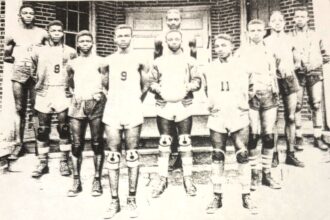Curse words were once intended for emphasis, or (as the name implies) to wish a curse upon someone. Sadly, those same terms are now more common than additional condiments with a bag of fast food.
When I was a kid, there were words that would get your tail torn up, and words that might, in some families, mean you were never seen again.
Maybe it wasn’t quite that bad, but I did see a classmate in middle school bodily lifted by the belt and taken outside for uttering a vulgarity we would now consider mild. The words uttered by the boy in the minutes after the hasty exit at the hands of his father were more emphatic, as well as infinitely more suitable for a mixed audience.
It wasn’t that long ago I occasionally wrote news stories about people being arrested for using vulgar language in public; now such citations are remarkably few and far between, although it’s not uncommon to hear or see words we once never dared use being bandied about with comparative comfort.
Now, I am all about freedom of speech; that doesn’t mean I endorse dropping “f-bombs” like apples from a frostbitten tree. I happen to believe – indeed, I know – that one can powerfully express one’s self without ever straying from a G rating. While I cannot stomach cussin’ as a common modifier, the beauty of the first amendment is that one can walk away from language one finds offensive. There are movies and books I dearly love which I have to be careful about since the unedited versions tend to surface more often than the expurgated ones. It’s frustrating.
I was brought up to believe that some types of language should never be used in public, some should never be said in mixed company, and some words should never be used at all. Call me old fashioned and a relic, and I will thank you for the compliment.
Naturally, as young’uns we took great pride in cussin’, since that was such a grownup thing, but some words – like the one used by classmate – just weren’t said. The Mama Surveillance System might not always register some lesser words, but by cracky, there were some that could be whispered in a sealed room a hundred miles from home, but still be heard by a mother (or father) who would be waiting with switch, belt, flyswatter, spoon or other implement of instruction when you returned home.
A college newspaper the other day gained headlines over a headline of its own, using one of those particular words, one which has apparently replaced “darn” in the daily vocabulary. I won’t name the school or the newspaper, since I don’t want them getting more Google search hits, even for a negative story. I will say that school has done more damage to my trade than any other in the state, whilst being held up as the be-all and end-all. The school itself has also become mecca for spoiled brat social justice warriors who will graduate to go live in their parents’ homes whilst they await a call to be a manager of some place that needs leadership from someone with a graduate degree in International Studies of Female Feline Art and Literature, with a minor in It’s Okay if You Hate All Things White, Christian, Southern and Straight. Indeed, there are places where I previously worked where this column never could have been published, even without naming the school in question.
Anyway, this particular school paper – which generations ago turned out some fine reporters and editors – used the F-word in a headline on its editorial page. Acceptable for some of its readership, I guess, and a doggone good way to use shock value.
What astounded me was how many people in my trade immediately praised said headline. I reckon the Associated Press stylebook will soon have a section on when to use the words that used to be banned from television.
I am ashamed to admit that I still drop a cuss word or two when something fairly significant happens. I worked and prayed a long time not to use any at all. I could make excuses for my occasional lapse, but there’s really no excuse. Between the names of vegetables no one likes, a smattering of nonsense combinations of words from foreign languages, and plain old fashioned country invectives, there are enough options for exclamations, pejorative descriptives and colorful metaphors that I don’t need to curse.
Curse words were once intended for emphasis, or (as the name implies) to wish a curse upon someone. There’s some interesting history behind some of the terms whose use once resulted in a bar of soap applied to the mouth or a switch to the rump. Sadly, those same terms are now more common than additional condiments with a bag of fast food.
I speak from experience here. Suffering from poor time management and frustration I made the mistake of going to a plastic-food place for supper. When I politely asked for a straw, the cashier couldn’t provide one without adding a drawn out “F —!” as she fulfilled my request.
I reckon I may be in the minority, considering the words I hear and see from folks for whom I normally have a lot of respect. Cussing loses its impact when a bomb is just another word. I can understand the occasional need for emphasis, or the need to exclaim when a finger gets mashed by a hammer, or your toe finds the coffee table in the dark, or 10,000 fireants make you question your choice of footwear and wardrobe. I can even understand the almost-conversational use of blue words by folks in the military.
But I cannot understand why middle-school kids are allowed to speak like they’re quoting an unedited, pre-release version of a Quentin Tarantino movie.
I guess I shouldn’t be surprised at the headline in the newspaper, since it comes from a college that flaunts state law, helps athletes to cheat so they can stay in school, and half-heartedly apologizes when critical, life-saving research is shown to have been intentionally manipulated. I do find it deliciously ironic that a school which descries capitalism flirts dangerously close to blackmailing its more successful alumni for donations. I’m not surprised when the campus police of said school are instructed not to enforce the law against some organizations that tear down statues and vandalize public property, but are given a free hand to keep pro-life and Christian groups “under control.”
I guess I shouldn’t be surprised at much of anything anymore, but it still makes me disgusted as – pardon me. I almost said something that would have gotten my mouth washed out, in a time before decency and courtesy went out of style, and people actually knew how to talk without cussing.
There again, as a very wise friend put it – if you’re raised in a polluted pond, you know nothing about clean water.








One Comment
Great article. I’m totally in agreement with the content. One thing I do not understand is the quote, ” I can even understand the almost-conversational use of blue words by folks in the military.”
What are blue words?